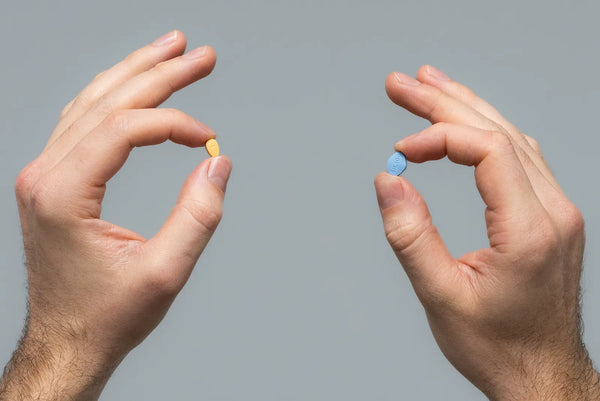High blood pressure (often referred to as hypertension) is one of the most common chronic medical conditions but it’s not always obvious whether someone has it. Even if you’re asymptomatic, high blood pressure is still an important risk factor for diseases such as heart attack, heart failure, stroke and kidney failure. These diseases can take time to develop but there are some early signs of high blood pressure that men should pay attention to, including (perhaps surprisingly) erectile dysfunction. In this article, we’re joined by Dr. Simon Pimstone, CEO and co-founder of XYON and practicing internal medicine and cardiac prevention specialist, for some additional insights on the relationship between erectile dysfunction (ED) and high blood pressure. Dr. Pimstone also weighs in on whether some of the more common drugs used to treat hypertension could worsen or improve ED symptoms.


Generic Viagra (Sildenafil) or Generic Cialis (Tadalafil) Now Available From XYON
Get the more affordable and equally effective options for treating erectile dysfunction. Complete your online consultation in minutes.
What is hypertension?
Hypertension (high blood pressure) occurs when the resistance to blood flowing through your arteries is too high. Blood pressure readings consistently at or above 130/80 mmHg are considered high. Globally, it’s estimated that over a billion adults are living with hypertension, representing about 45% of the adult population. Additionally, approximately 60% of people over the age of 60 are said to have hypertension (Iqbal and Jamal, 2023). By damaging the blood vessel wall, hypertension can affect blood flow (and therefore oxygen supply) to parts of the body, causing damage to organs over time or encouraging potentially dangerous blood clots to form. Fortunately, once it’s diagnosed, uncomplicated hypertension can be treated with a combination of lifestyle modifications, stress management and the use of one or more of the different classes of blood pressure medications.
How does having high blood pressure cause erectile dysfunction?
“Hypertension can be associated with ED. High blood pressure can cause a “stiffening” of the arteries and lead to inflammation and atherosclerosis (the buildup of fat, cholesterol and other substances on the inside walls of the arteries), which can limit the flow of blood to the penis. Since penile blood flow is necessary for a man to get and maintain an erection, any vascular problem that might limit the flow of blood, can result in ED.”
In young men in particular, ED can be an early warning sign of underlying cardiovascular disease (Schmid et al, 2023). Reduced blood flow to this part of the body could be a sign of blood vessels elsewhere in the body being affected by disease processes like the atherosclerosis Dr. Pimstone described. ED may therefore be the canary in the coalmine, leading to the discovery of other systemic disorders, such as hypertension or atherosclerosis.
Can ED from high blood pressure be reversed?
In the same way that general hypertension can be treated, ED due to high blood pressure may also be reversed with the right management. Dr. Pimstone elaboarates:
"It is important however to note that with hypertension and ED, there might be other bad actors lurking, such as atherosclerosis, high cholesterol, or elevated blood sugar (or diabetes) that also need to be treated. Treating high blood pressure on its own may not be sufficient.
ED that’s caused by or associated with elevated blood pressure is generally reversible if it’s the sole cause of ED symptoms. When blood pressure is under good control, we might expect some amount of improvement in the reactivity of the blood vessels and the flow of blood to the penis. However, it’s important to keep in mind that ED has many potential causes and that these would need to be addressed to ensure that sexual dysfunction is being appropriately addressed.”
What is considered high blood pressure in relation to ED?
“The definition of elevated blood pressure can depend on factors like the individual risk for vascular disease, age or other diseases such as diabetes. Generally speaking, an ideal blood pressure reading is 120/80 mmHg. What some people might not be aware of is that US and Canadian Cardiovascular Guidelines define hypertension in two stages: Stage 1 applies to situations when blood pressure is 130-139/80-89 mmHg and Stage 2 applies when blood pressure is greater than 140/90 mmHg. The ranges for normal and high blood pressure in a patient with ED are consistent with the above.”
Can you take Viagra if you're on high blood pressure medication?
“Generally, yes, PDE5 inhibitors such as sildenafil (generic Viagra) and tadalafil (generic Cialis) can be taken if you’re on a blood pressure medication. However, sildenafil and tadalafil need to be avoided if you’re also taking a nitroglycerin-based medication (nitrates) which are usually prescribed for patients with symptoms of chest pain (angina) secondary to coronary artery disease. Because patients with high blood pressure may also have cardiovascular disease, it’s important to be aware of potential medication interactions and to share this information with your doctor. PDE5 inhibitors can generally be used safely with non-nitroglycerin-containing blood pressure medications, but care should be taken as these medications together might result in an exaggerated lowering of blood pressure which can lead to symptoms such as dizziness or even fainting.”
What effect does tadalafil have on blood pressure?
“It’s possible for patients to experience modest reductions in blood pressure when using medications like tadalafil or sildenafil. These blood pressure changes are generally quite small in the 5-10mmHg range. In addition to ED, PDE5 inhibitors can also be used to treat a condition known as pulmonary artery hypertension (elevated pressure specifically in the lungs and right side of the heart), which is a different disorder than the more common systemic hypertension where blood pressure is elevated. In pulmonary artery hypertension, existing lung disorders or the presence of chronic lung clots may be the cause of elevated pressure. PDE5 inhibitors may help lung pressure in these situations.”
Takeaway: high blood pressure and erectile dysfunction
High blood pressure is a common chronic medical condition that can cause ED in men. This is because the ability to achieve and maintain an erection are dependent on adequate blood flow to the penis and high blood pressure can cause blood vessels to narrow (both functionally and structurally), reducing flow to this part of the body. The risk for ED may be higher in people who have a history of cardiovascular disease (or related comorbidities such as diabetes). Because of this link, men experiencing changes in erectile function may want to talk to their doctors to rule out the possibility of underlying heart disease or other medical concerns.
Common PDE5 inhibitors like sildenafil (generic Viagra) and tadalafil (generic Cialis) can be prescribed to help with ED by relaxing the smooth muscle in blood vessels. They can have a small effect on blood pressure (especially in the lungs) but for systemic management of high blood pressure, dedicated hypertension medications are generally still needed. Worried about or experiencing ED? Connect with a doctor today to find out whether ED medication could help you take back some control over your sex life.
Citations:
Iqbal, A. M., & Jamal, S. F. (2023). Essential Hypertension. In StatPearls. StatPearls Publishing.
Li, L., Zhang, Y., Ma, M., Liu, F., Shang, Y., Yuan, Q., Li, X., & Ju, B. (2024). Does erectile dysfunction predict cardiovascular risk? A cross-sectional study of clinical characteristics in patients with erectile dysfunction combined with coronary heart disease. Frontiers in Cardiovascular Medicine, 11, 1341819. https://doi.org/10.3389/fcvm.2024.1341819.
Schmid, F. A., Mergen, V., Bärlocher, T., Kaufmann, B., Epprecht, L., Soyka, M. B., Eberli, D., & Hötker, A. M. (2023). Atherosclerosis of the iliac arteries for the prediction of erectile dysfunction and epistaxis in men undergoing abdominal CT scan. BMC Urology, 23(1), 173. https://doi.org/10.1186/s12894-023-01340-4.




